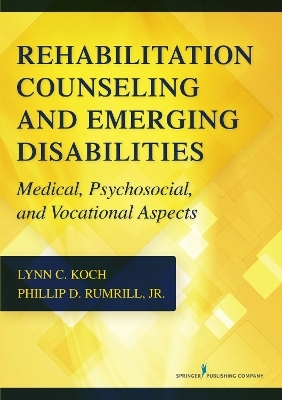
Rehabilitation Counseling and Emerging Disabilities
Springer Publishing Co Inc (Verlag)
978-0-8261-2068-7 (ISBN)
The book explores important sociological and environmental phenomena such as global warming, pollution, poverty, violence, migration patterns, addiction, and substance abuse, and the changing age demographic of the United States that has altered the landscape of disability policy and rehabilitation services in the 21st century. Each chapter provides specific examples of disabling conditions and discusses their medical, psychosocial, and vocational significance. The authors examine implications for rehabilitation assessment, planning, and placement, and emphasize changes needed to rehabilitation policy and practice. The text is replete with practical evidence-based strategies for meeting the psychosocial and vocational needs of people with emerging disabilities. Chapters include case examples, learning objectives, and discussion questions.
Key Features:
Describes disabling conditions either new to medical science or increasing in prevalence in modern society
Examines sociocultural, environmental, and legislative trends that have resulted in emerging disabilities
Delivers policy, programming, and research recommendations to improve services and supports for Americans with emerging disabilities
Provides practical, evidence-based strategies for meeting the psychosocial and vocational needs of people with emerging disabilities
Includes learning objectives, case examples, and discussion questions
Supplemental materials include PowerPoints, syllabus, and test bank
Lynn C. Koch, PhD, CRC, is a nationally certified rehabilitation counselor and professor, Rehabilitation Education and Research Program, University of Arkansas. Phillip D. Rumrill, Jr., PhD, CRC, is professor and coordinator, Rehabilitation Counseling Program, and director, Center for Disability Studies, Kent State University, Ohio.
Contents
Contributors
Foreword by Malachy Bishop
Preface
1. INTRODUCTION TO EMERGING DISABILITIES
Chapter Objectives
Defining Emerging Disabilities
Contemporary Trends Linked to Emerging Disabilities
Medical, Psychosocial, and Vocational Characteristics of Emerging Disabilities
Populations at Risk of Acquiring Emerging Disabilities
Conclusions
Discussion Questions
2. CHRONIC PAIN
Chapter Objectives
Case Illustration: Linda
Definitions, Types, and Causes of Chronic Pain
Examples of Emerging Chronic Pain Conditions
Psychosocial Aspects of Chronic Pain
Vocational Aspects of Chronic Pain
Characteristics of Individuals Living With Chronic Pain
Rehabilitation Counseling Implications
Rehabilitation Assessment and Planning
Rehabilitation Services
Conclusions
Discussion Questions
3. NEURODEVELOPMENTAL DISABILITIES: AUTISM SPECTRUM DISORDER AND ATTENTION DEFICIT HYPERACTIVITY DISORDER
Coauthored by Frank J. Sansosti With Contributions From Alexa Herrera
Chapter Objectives
Case Illustration: Conner
Autism Spectrum Disorder
Attention Deficit Hyperactivity Disorder
Psychosocial Aspects of ASD and ADHD
Vocational Aspects of ASD and ADHD
Characteristics of Individuals With ASD and ADHD
Rehabilitation Counseling Implications
Conclusions
Discussion Questions
4. DISABILITIES RELATED TO AGING
Coauthored by Kelly Cichy and Mykal Leslie
Chapter Objectives
Case Illustration: Adaline
The Graying of America
Implications of Population Aging
Aging, Health, and Disability
Medical, Psychosocial, and Vocational Aspects of Emerging Age-Related Disabilities
Rehabilitation Counseling Implications
Conclusions
Discussion Questions
5. EMERGING POPULATIONS AND ISSUES IN PSYCHIATRIC REHABILITATION
Coauthored by Stephanie L. Lusk
Chapter Objectives
Case Illustration: Maya
Youths and Young Adults With Psychiatric Disabilities
College Students With Psychiatric Disabilities
Individuals With Psychiatric Disabilities and Co-Occurring Medical Conditions
Individuals With Psychiatric Disabilities and Co-Occurring Substance Use Disorders
Psychiatric Disabilities and Corrections Involvement
Rehabilitation Counseling Implications: A Recovery-Oriented Approach
Conclusions
Discussion Questions
6. EMERGING DISABILITIES ASSOCIATED WITH LIFESTYLE AND CLIMATE CHANGE
With Contributions by Rachel Timblin
Chapter Objectives
Case Illustration: David
Emerging Disabilities Linked to Lifestyle
Emerging Disabilities Linked to Climate Change
Psychosocial Aspects
Vocational Aspects
Characteristics of Individuals at Risk for Lifestyle Disabilities and Disabilities Linked to Climate Change
Rehabilitation Counseling Implications
Conclusions
Discussion Questions
7. DISABILITIES CAUSED BY VIOLENCE
Coauthored by Melissa D. Wilkins
Chapter Objectives
Case Illustration: Amalia
Types of Violence and Resulting Disabilities
Psychosocial Implications
Vocational Implications
Demographic Characteristics of People at Risk of Experiencing Disabilities Related to Violence
Rehabilitation Counseling Implications
Rehabilitation Services
Conclusions
Discussion Questions
8. REHABILITATION COUNSELING IMPLICATIONS
Chapter Objectives
Self-Reflective Practice
Outreach and Eligibility Determination
Rehabilitation Assessment and Planning
Rehabilitation Services
Conclusions
Discussion Questions
9. NEW DIRECTIONS IN EMERGING DISABILITIES RESEARCH
Chapter Objectives
A Framework for Organizing Rehabilitation Counseling Research Involving People With Emerging Disabilities
The Role of Theory in Emerging Disabilities Research
Emerging Subject and Topic Areas in Rehabilitation Counseling Research
Emerging Research Techniques and Strategies
Conclusions
Discussion Questions
Index
| Erscheinungsdatum | 05.10.2016 |
|---|---|
| Verlagsort | New York |
| Sprache | englisch |
| Maße | 178 x 254 mm |
| Themenwelt | Medizin / Pharmazie ► Medizinische Fachgebiete ► Psychiatrie / Psychotherapie |
| Medizin / Pharmazie ► Physiotherapie / Ergotherapie ► Rehabilitation | |
| Sozialwissenschaften ► Soziologie | |
| ISBN-10 | 0-8261-2068-7 / 0826120687 |
| ISBN-13 | 978-0-8261-2068-7 / 9780826120687 |
| Zustand | Neuware |
| Haben Sie eine Frage zum Produkt? |
aus dem Bereich


